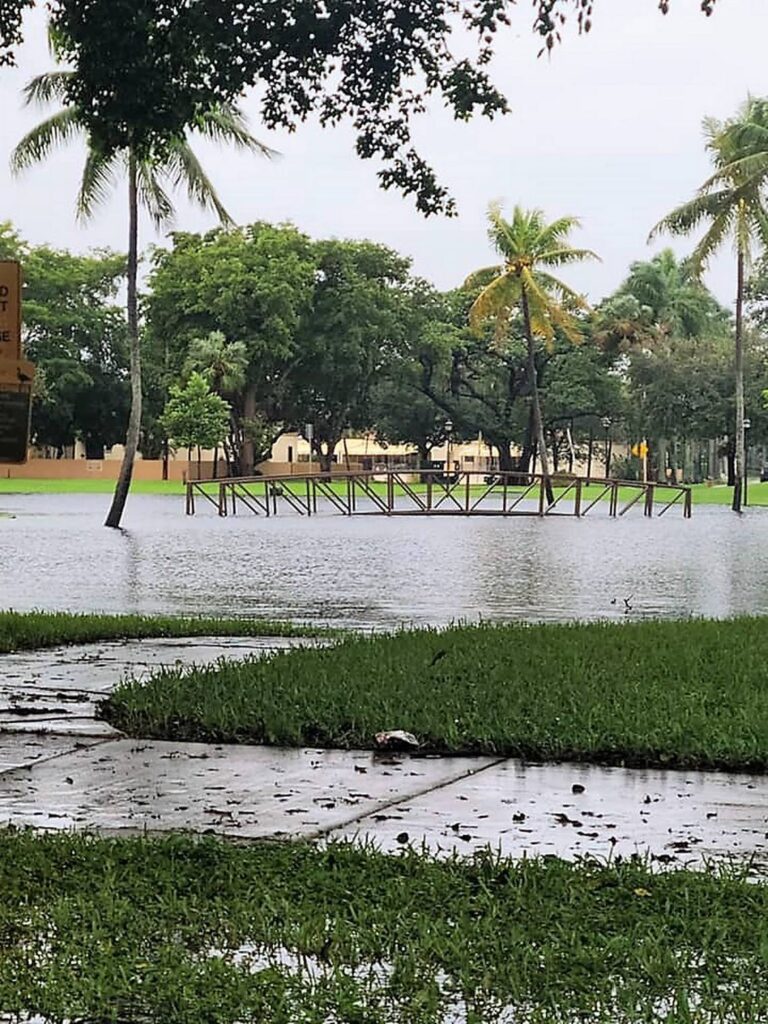By Fabiola Santiago, Miami Herald columnist
Like many in South Florida, thanks to Tropical Storm Eta’s relentless soaking, I woke up to lakefront property Monday — and no internet, no television connection all day long.
A day later, the water was sitting there with nowhere to go, flowing with force during wind gusts and drive-bys and getting perilously close to the house. As I wrote these words, I prayed that my restored connection would hold..
It’s was really hard to concentrate on my job from this “island,” where, all of a sudden, the electricity and connectivity you pay for and take for granted aren’t a sure thing.
The situation was serious and unnerving.

Eta, the 29th named storm of the season, wasn’t even a hurricane — and we’re drowning in South Florida.
While areas that typically flood like Brickell in Miami-Dade and Fort Lauderdale neighborhoods in Broward are getting all the attention as the places most affected, some cities like Miami Lakes where I live are experiencing flooding we haven’t seen in modern times.
There were children paddling a yellow float down one street, using an umbrella as a sail.Other people took photos of their streets with knee-deep water and photo-shopped on them the Loch Ness Monster rising and Shamu jumping.
A Hialeah warehouse district turned into a Jet-Ski zone.
“I don’t know where I am anymore. Everything is under water,” wrote Melissa Cuartas on a post on the I Love Miami Lakes residents’ Facebook page over a photo of a green area where a crossing bridge is almost underwater.
The resting bench already is!

“Everglades we were and to Everglades we shall return!” answered resident Audrey Garasi Valhuerdi.
There are stalled cars and traffic lights out everywhere, just as if a hurricane had hurled in.
Need to go to the supermarket?
Out of the question.
Going to school on Tuesday as the powers-that-be directed?
Don’t be foolish.
Some teachers drove through perilous streets to their schools only to find out they, too, would be part of the list in flooded areas pivoting to online learning.
If your street didn’t flood, you still couldn’t get out of your neighborhood because other thoroughfares did flood. Streets were dangerously deeper than they seemed at first.
It was — and still is — a mess.
The unprecedented flooding in Florida areas thought to be drier than lower-lying coastal cities subject to storm surge proves that we’re all vulnerable to the stronger, longer-lasting effects of climate change on hurricane season.
“Scientists can’t say for sure whether global warming is causing more hurricanes, but they are confident that it’s changing the way storms behave,” the New York Times reported Tuesday.
Warmer waters are “the energy that fuels storms,” making hurricanes (and tropical storms) more powerful, and also more of a heavier rainmaker since “warming also increases the amount of water vapor that the atmosphere can hold,” experts told the newspaper.
Eta’s passage through Florida fits the science to a T.
As a slower, wetter storm, it worsened the flooding — and it wasn’t even a direct hit, so to speak. The overflowing lake netted the neighbor across from my house a dead fish on his doorstep.
We almost made it to Nov. 30, the official ending of hurricane season, unscathed.
We were so sure in South Florida that we were getting away without a brush. Hurricanes seemed to slam everyone but us. We could look at the Gulf Coast and say, those poor souls!
But the crazy storm just won’t stop for anyone.
The 2020 hurricane season has become the most active in recorded history with Subtropical Storm Theta sitting out in the Atlantic.
Global warming is real, folks, not just a concept put out there that only concerns the scientists.
Eta’s rains are here to show us just how up close and personal climate change can get in all of South Florida.
Call it nature exposing our weaknesses, our fault lines — and demanding that we do in our cities the work of becoming more resilient.
Update: As Eta’s winds and rain battered the west coast of Florida Wednesday, on track to cross the state, we began to dry out in Northwest Miami-Dade and Broward counties.
Award-winning columnist Fabiola Santiago has been writing about all things Miami since 1980, when the Mariel boatlift became her first front-page story. A Cuban refugee child of the Freedom Flights, she’s also the author of essays, short fiction, and the novel “Reclaiming Paris.”
“The Invading Sea” is the opinion arm of the Florida Climate Reporting Network, a collaborative of news organizations across the state focusing on the threats posed by the warming climate.



